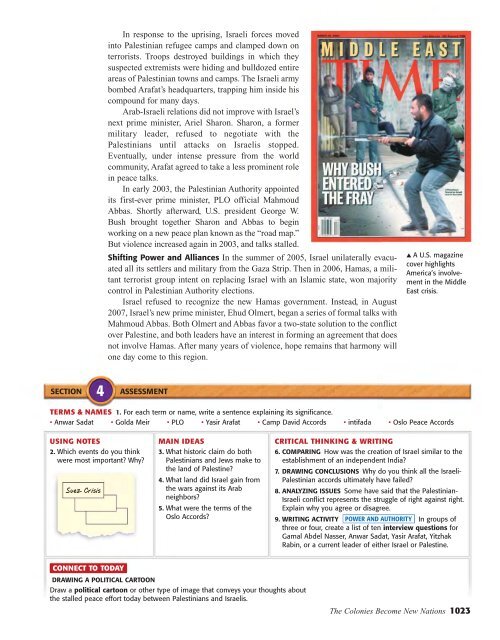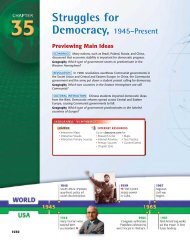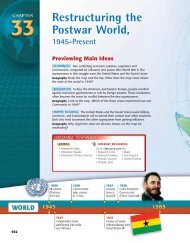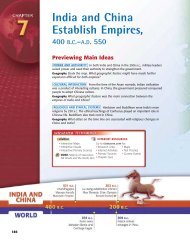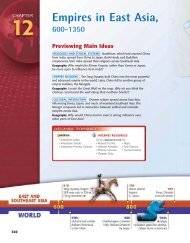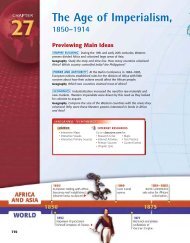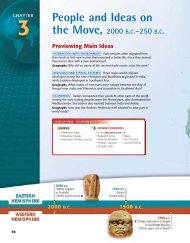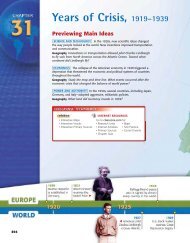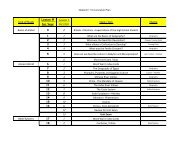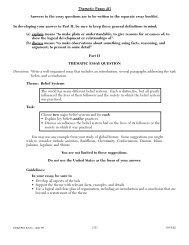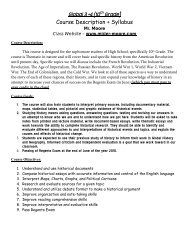Chapter 34 - First
Chapter 34 - First
Chapter 34 - First
Create successful ePaper yourself
Turn your PDF publications into a flip-book with our unique Google optimized e-Paper software.
SECTION 4 ASSESSMENT<br />
TERMS & NAMES 1. For each term or name, write a sentence explaining its significance.<br />
• Anwar Sadat • Golda Meir • PLO • Yasir Arafat • Camp David Accords • intifada • Oslo Peace Accords<br />
USING NOTES<br />
2. Which events do you think<br />
were most important? Why?<br />
Suez Crisis<br />
In response to the uprising, Israeli forces moved<br />
into Palestinian refugee camps and clamped down on<br />
terrorists. Troops destroyed buildings in which they<br />
suspected extremists were hiding and bulldozed entire<br />
areas of Palestinian towns and camps. The Israeli army<br />
bombed Arafat’s headquarters, trapping him inside his<br />
compound for many days.<br />
Arab-Israeli relations did not improve with Israel’s<br />
next prime minister, Ariel Sharon. Sharon, a former<br />
military leader, refused to negotiate with the<br />
Palestinians until attacks on Israelis stopped.<br />
Eventually, under intense pressure from the world<br />
community, Arafat agreed to take a less prominent role<br />
in peace talks.<br />
In early 2003, the Palestinian Authority appointed<br />
its first-ever prime minister, PLO official Mahmoud<br />
Abbas. Shortly afterward, U.S. president George W.<br />
Bush brought together Sharon and Abbas to begin<br />
working on a new peace plan known as the “road map.”<br />
But violence increased again in 2003, and talks stalled.<br />
Shifting Power and Alliances In the summer of 2005, Israel unilaterally evacuated<br />
all its settlers and military from the Gaza Strip. Then in 2006, Hamas, a militant<br />
terrorist group intent on replacing Israel with an Islamic state, won majority<br />
control in Palestinian Authority elections.<br />
Israel refused to recognize the new Hamas government. Instead, in August<br />
2007, Israel’s new prime minister, Ehud Olmert, began a series of formal talks with<br />
Mahmoud Abbas. Both Olmert and Abbas favor a two-state solution to the conflict<br />
over Palestine, and both leaders have an interest in forming an agreement that does<br />
not involve Hamas. After many years of violence, hope remains that harmony will<br />
one day come to this region.<br />
MAIN IDEAS<br />
3. What historic claim do both<br />
Palestinians and Jews make to<br />
the land of Palestine?<br />
4. What land did Israel gain from<br />
the wars against its Arab<br />
neighbors?<br />
5. What were the terms of the<br />
Oslo Accords?<br />
CONNECT TO TODAY<br />
DRAWING A POLITICAL CARTOON<br />
Draw a political cartoon or other type of image that conveys your thoughts about<br />
the stalled peace effort today between Palestinians and Israelis.<br />
▲ A U.S. magazine<br />
cover highlights<br />
America’s involvement<br />
in the Middle<br />
East crisis.<br />
CRITICAL THINKING & WRITING<br />
6. COMPARING How was the creation of Israel similar to the<br />
establishment of an independent India?<br />
7. DRAWING CONCLUSIONS Why do you think all the Israeli-<br />
Palestinian accords ultimately have failed?<br />
8. ANALYZING ISSUES Some have said that the Palestinian-<br />
Israeli conflict represents the struggle of right against right.<br />
Explain why you agree or disagree.<br />
9. WRITING ACTIVITY POWER AND AUTHORITY In groups of<br />
three or four, create a list of ten interview questions for<br />
Gamal Abdel Nasser, Anwar Sadat, Yasir Arafat, Yitzhak<br />
Rabin, or a current leader of either Israel or Palestine.<br />
The Colonies Become New Nations 1023


